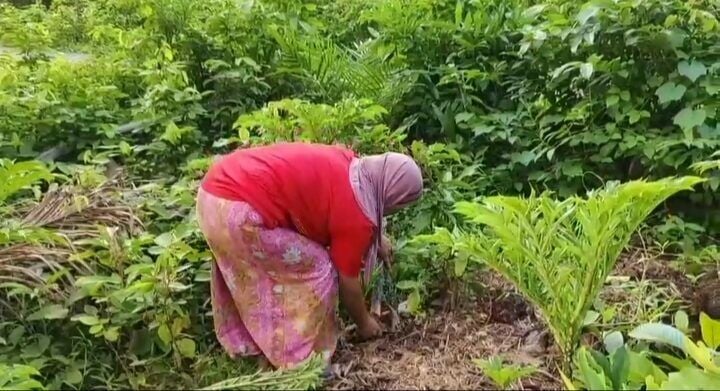Villagers in Satun eagerly harvest wild konjac for gourmet dishes

Residents of a village in Satun Province, eagerly gathered to harvest the wild-growing konjac plants, a seasonal delicacy that sprouts only once a year at the beginning of the rainy season. The konjac, known for its delicious taste, is a prized ingredient for local culinary delights.
Villagers are seen scouring the grasslands, palm plantations, and rubber tree farms for the konjac plants, which grow rapidly. Harvesting must be done before the plants develop leaves, as the leaves cause an itchy sensation and render the plant inedible.
The villagers cherish this once-a-year opportunity to gather konjac for cooking, considering it a culinary treasure. The plants grow swiftly, and within just two days, tiny sprouts can turn into fully leafed plants, making timely collection crucial.
After collecting the konjac from the wild, the preparation process begins. The outer skin is peeled off, and the plant is cut into sections. These sections are then sliced lengthwise and chopped into pieces. The pieces are thoroughly washed before being used in various dishes. Konjac resembles the texture of lotus stems but is softer and more slippery.
One popular dish made from konjac is a coconut milk soup, prepared in a pan with lemongrass, shallots, garlic and shrimp paste. Another favourite is a herbal vegetable soup known as ‘Kaeng Liang’.
A key technique in cooking konjac involves a lengthy boiling process until the desired tenderness to eliminate risks of it causing severe itchiness.
Konjac dishes are traditional and highly esteemed, especially during the early rainy season. They are often featured in communal feasts and celebrations such as religious ceremonies and weddings, reported KhaoSod.
The collection and preparation of konjac plants not only provide a unique gastronomic experience but also foster community bonding as villagers come together to share this seasonal bounty. This annual tradition highlights the importance of local knowledge and culinary skills in transforming a wild plant into a gourmet delight.
This seasonal activity is a cherished part of the local culture, demonstrating the community’s connection to their natural environment and their ability to utilise its resources creatively and deliciously.
Latest Thailand News
Follow The Thaiger on Google News:


























